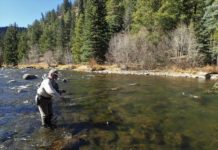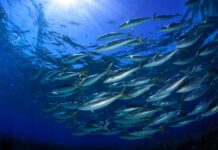The Chestatee River is there somewhere. It shows on the map winding through the hills just south of Dahlonega in north Georgia. “Chestatee” is on road signs along US 19. But the river is hard to see from a public road, and you can’t hear its rushing water.
It’s no wonder the river is elusive. Foreboding signs are all around the river. No Trespassing. No Fishing. No River Access. No Parking. No Turnaround. Private Road.
Welcome to The Land of No.
The state has forever been a champion of property owners and the might of landowners is showing up around the rivers and streams. Sections of waterways have been walled off from kayakers, tubers, and anglers because public access is denied in long stretches of shoreline. It might seem absurd to be in the middle of the wilderness and see a “No Fishing” sign nailed to a tree leaning out over the river 20 feet above the water.
The Georgia Wildlife Federation, the Flint Riverkeeper, and the Altamaha Riverkeeper are pushing back on “No.”
They wrote a public letter, which is making the rounds to state agencies and legislators decrying the increasing lack of public access to waterways in the state. From the letter:
“In recent years a growing number of landowners and those leasing ‘fishing rights’ from them are seeking to limit the public’s access to our rivers and streams as anglers. ‘No Fishing’ signs have popped up all over Georgia next to our free-flowing rivers, whose populations of fish have been managed and protected by dedicated public servants. Those dedicated public servants’ salaries and resources are paid by those that hunt and fish, not by those that own land. Our access to these rivers is via boat ramps that are more often than not paid for by hunters and anglers.”
The issue is especially frothy on the Flint River where anglers hunt the internationally famous shoal bass in an area known as Yellow Jacket Shoals. One sign popped up along the banks saying fishing is by permit only, or not at all.
Mike Worley, the president and CEO of the Georgia Wildlife Federation, said he was getting calls from anglers caught off guard by “No Fishing” signs on the Flint.
“They said they’ve been able to fish this stretch of the river for years and all of a sudden there are no fishing signs,” Worley said. “We wrote the letter saying that it’s time for us to really take a stand that these stretches of river can’t be closed to fishermen.”
Worley said property owners contend they own the bottom of the river from the shore to the centerline of the river. The state statute, he said, maintains that if a river is determined to be navigable, the private landowner only controls to the low watermark, or to that water at his ankles, which is where the fish typically are not.
The Georgia Department of Natural Resources Enforcement is siding with the anglers. The department’s Lt. Judd Smith said DNR would not be writing any citations for fishing on the Flint. It is considered a “navigable” waterway and even if property owners show a deed that extends their property line into the water, they cannot restrict fishing or floating.
Smith said even if a property owner has deed to both sides of the Flint, they cannot restrict fishing.
“The landowner certainly is within their rights to say no trespassing; you can’t get out and go on to their land if they say you can’t,” Worley said. “But if law enforcement folks won’t write a ticket it’s hard to make an argument that they have the right to say that you can’t fish there.”
Of course, property owners could take the law into their own hands, and one did with almost disastrous results. In 2020, Samuel Brewton III fired a gun at a family on a canoe ride on the Flint. He was found guilty of four counts of aggravated assault and is serving 10 years in prison and was fined $10,000. The Brewton family is a major landowner near Yellow Jacket Shoals and Brewton III considered the canoers trespassers.
Gordon Rogers, executive director of the Flint Riverkeeper, worries that the debate over who owns what on the Flint is not over.
“In our view the situation with fishing rights is not settled law,” Rogers said. “You will hear some people say that it’s settled law in terms of how the rights are determined. Based on the advice of counsel this area of the law is far from settled.”
A court fight is brewing, especially since property owners on the Flint have sold leases to fishing guides to what they assume is their property out on the water. The fishing guides, of course, charge for excursions.
It’s in the public interest for the issue to be resolved because the economic impact of outdoor recreation is significant.
Georgia ranks eighth among states in value added to a state’s economy by boating or fishing, according to the Bureau of Economic Analysis from the U.S. Department of Commerce. The study says the value added by the outdoor recreation economy is $10.8 billion.
While disputes on the Flint might be settled because of DNR’s pronouncement that it would not issue citations, it is far more muddled in north Georgia. Those waterways, such as the Toccoa, Chestatee, and Soque are considered “non-navigable” unlike the Flint, which is considered “navigable.”
That is a crucial distinction. The DNR’s Smith said a property owner on the Chestatee can post a “No Fishing” sign on their side of the river and have it enforced with a deed that extends to the middle of the river. If the property owner has deed to both sides of the river, say for a mile, they can post “No Fishing.” Anglers can then be cited for breaking the law if they drop a line in the water, Smith said.
What is important, Smith said, is that property owners cannot stop a kayaker from floating through, even if they own both sides of the water.
If the property owner on one side of the river says “No Fishing” they can enter into an agreement with the owner on the other side to restrict fishing in that stretch of the river, Smith said. But they cannot tell kayakers they cannot float through.
One of the problems with the “NO” surrounding the waterway vistas is that it is difficult to find riverside property owners to talk to about it. They are often behind locked gates, or they hang menacing signs warning “Beware of Dogs.” They often live down gravel roads with signs warning “Private Road” and “No Trespass.”
But just go on what they consider their property and you can find them, or they find you.
In May, the YouTube fishing sensation John Dalton, who has 97,000 subscribers, fished the Chestatee. He was floating along casting for fish and a voice came from over his shoulder that he was not allowed to fish on one side of the water (4:37 mark).
Dalton’s GoPro camera then caught view of a sign hammered to a tree hanging out over the water that read “No fishing.”
There was an aggravated exchange between the man who claimed property ownership and Dalton before the angler moved on. Many other anglers could be caught up in that situation, unaware of the DNR interpretation that floating through is OK.
Stacy Jarrard, the sheriff of Lumpkin County, said he cannot recall a property owner calling his office about an angler on private property this year. If the sheriff is called, the office refers the property owner to DNR.
Some property owners feed the fish and help grow the fish population. Worley said he knows of landowners on Georgia streams that do private stockings of fish and manage that fishery. He does not want this issue to become so contentious that those property owners are alienated.
“If you look at our mission statement it is promoting hunters and anglers and their relationships with private landowners,” Worley said. “This is a really important issue for us.”
Fees and taxes paid by anglers build boat ramps and stock streams with fish. Those assets are not collected through ad valorem taxes paid by property owners, Worley said, but by the users.
There are some waterways, like the Soque River in Habersham County, that are not floatable during certain times of the year. If a kayaker runs into a low water area and has to get out and walk they could be trespassing.
A property owner along the Soque, Blackhawk Fly Fishing, reached by phone said they own both sides of the river and it’s non-navigable and people cannot float through their property.
Jon Ron has been a Toccoa River Outfitter since 2007 in Fannin County. Juanita Edwards, who owns the business with her husband, Ron, said if property owners on the Flint succeed with restrictions the same thing could happen on the Toccoa and waterways in north Georgia.
“There’s not a way to be on this river without floating through some private property,” Juanita Edwards said.
She recalled a property owner on one stretch on the upper Toccoa who stretched a cable and signage across the water because he owned both sides of the river. “He had guys on four-wheelers out there patrolling the river,” she said.
Worley and the Georgia Wildlife Federation do not want to be caught in the middle of a dispute between landowners, anglers and boaters.
“We work with private landowners to make sure that they can manage their lands for wildlife and we do some advisement with them,” he said. “But one of our primary roles is also to monitor and make sure that the interests of hunters, anglers and the public are served at the Capitol.”
Credit: Source link































